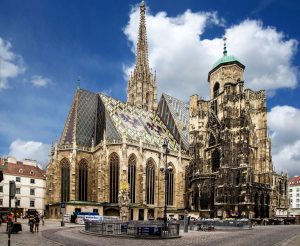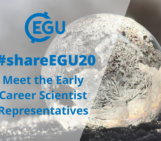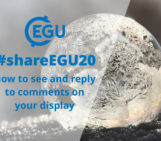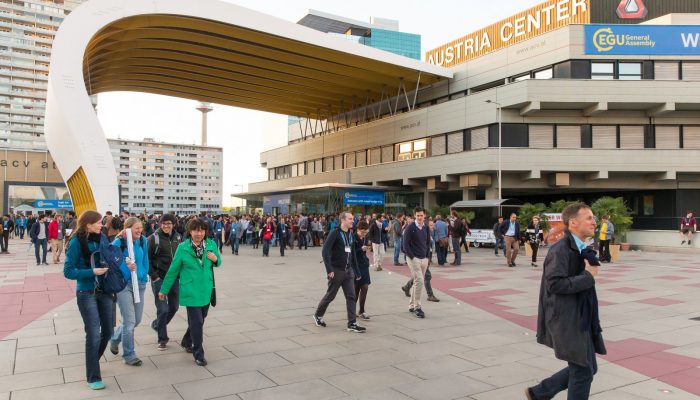
Attending a conference is not cheap, even if you’ve been lucky enough to secure some funds to help with travel, accommodation and/or registration costs. However, with a little insider knowledge from those who’ve attended the General Assembly many times before, it is possible to have a (scientifically) rewarding week in Vienna, without breaking the bank.
Before you get there
A sure way to save a few cents (or pennies) is to book your accommodation and travel early. With over 13,000 participants at the conference last year, the race for places to stay and transport to get to Vienna is fierce. Booking early will not only mean you have more choice of places to stay and times to travel, but will ensure you get the most competitive prices too.
For those travelling by plane to the conference, a top tip is to look for flights to Bratislava. The Slovakian capital is only 80km away from Vienna and well connected via bus, train and even boat! Bratislava airport is served by a good selection of low cost airlines and it’s often cheaper to fly there than directly to Vienna. A bus ticket between the two cities can cost as little as one Euro (if booked well in advance) with the average for a return train trip being around 14 euro. If that’s not enough to persuade you, it’s worth factoring in a little time to discover the city. It’s a warren of quaint little streets, an imposing castle and good, affordable beer and food.
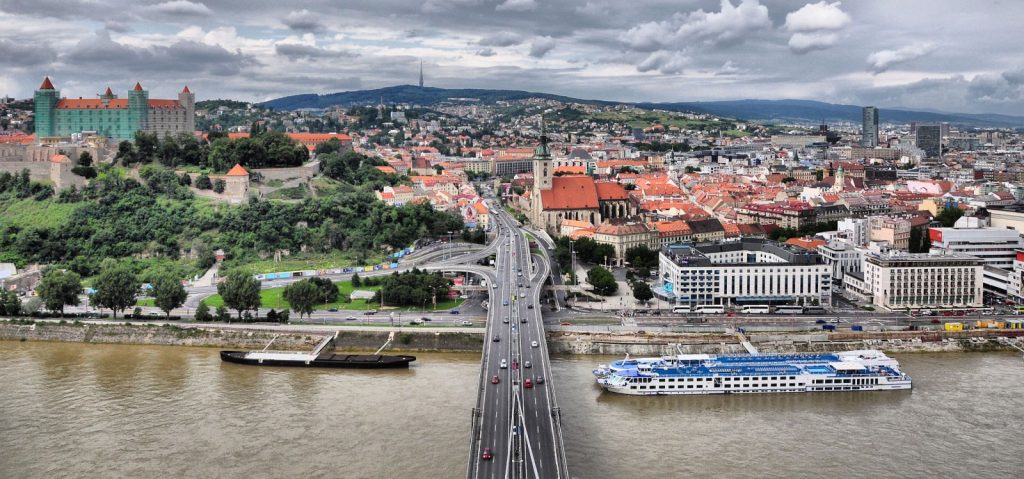
Bratislava Old Town. Credit: Xlibber (distributed via Wikimedia Commons)
If you’d rather head straight to Vienna, booking your arrival and departure for the day(s) before and after the conference can result in considerable savings. And, if you’re ok with longer journeys, you might consider the train or the bus, which are often more affordable too.
Somewhere to stay
Sharing accommodation is an easy way to keep costs down. If you are travelling with colleagues consider sharing with them. If you are traveling on your own, or unable to share with colleagues, reach out to contacts you made in the past, be it a former undergrad friend, or someone you met during a workshop. They may not be in your immediate field anymore, but it might offer added bonuses like the option to reconnect and forge new links.
Hotels can be expensive. Hostels offer an affordable alternative and are bound to be packed with fellow EGU goers. Alternatively, look for beds, rooms and/or apartments via Couchsurfing, AirBnB or similar services.
A week of eating out can take its toll, both on the purse strings and on the waistline! Opt for accommodation options which have kitchenettes or full kitchens. You’ll be able to prepare some meals at your home from home, saving a little cash. Plus, you might even have enough space to entertain old friends and potential new collaborators!
Exploring Vienna
If you need a breather from all the science (and the ECS Lounge isn’t enough), or you have a few days before or after the conference to discover the Austrian capital, keep in mind that the city’s public transport is excellent. Staying outside of the city centre guarantees cheaper accommodation prices, but staying along the U1 underground (ubahn) line ensure quick and easy access to all the main tourist spots and the conference centre to boot!
If you’d rather opt for a more energetic option, then the city’s bike rental scheme might be just the ticket. You need to register for the scheme before you can use the bikes, but with 120 stations across the city, and a 4 hour rental costing 4 Euros, this an environmentally friendly and cheap option definitely worth considering.
Vienna has plenty to offer, from beautiful parks and gardens, through to impressive architecture and a plethora of museums (and sachertorte, of course). Visit Wien Null for a great selection of tips on how to enjoy the city to the full, without breaking the bank. The site has information about arts and culture events, free wifi spots, the best places to go for a bite to eat or a drink, as well as a selection of affordable sport options too.
You should also stay tuned to the blog on the final day of the conference. Our team of press assistants put together a blog post highlighting what’s on in Vienna over the weekend. So if you plan to extend your trip to after the conference, you’ll certainly be able to pick up some pointers. Let last year’s post serve as a starting point.
Finding funding
If your research budget won’t stretch to financing a trip to the General Assembly, don’t despair, there are a number of options you can consider. Though it might be a little late to apply for these for the upcoming conference, keep them in mind for the 2018 edition instead.
Submit your abstract to the conference between October and December and you can apply for financial support to travel to the General Assembly (from the EGU). Grants are competitive, but that doesn’t mean one shouldn’t try- if you want to apply, make sure you follow the criteria carefully, as the evaluation is based on how well you satisfy them. You can also consider participating in the EGU’s OSPP Awards, Imaggeo Photo Contest and Communicate your Science Video Competition (submissions for the 2017 editions of all contests are now closed). Not only will it give your CV a boost if you win, it’ll ensure free registration to the following year’s conference.
Many institutions also offer travel support, especially if you are presenting. Seek advice from your advisor and/or the graduate school (if your institute has one) to learn more about what funds are available. Also, find out if your institute/university is a member of Research Professional, which includes a database of all funding options available, no matter how small, including travel grants.
Similarly, there might be schemes available at the national level, be it from funding bodies or directly from the government. They often fall under the ‘short research stay’ category.
Learned societies, e.g. Institute for Civil Engineering, Institution of Engineering & Technology, often have pots of money set aside to support travel to conferences. They sometimes require you to have been a member for a set amount of time before you can apply for support, but there are many benefits to joining, so it’s a worthy investment.
For more tips and tricks, particularly if you’ve never been to the conference before, don’t forget to check our First Timer’s Guide. While we hope this post goes some way toward making the conference an affordable experience, it is by no means comprehensive.Help us make it better by sharing your suggestions on how to make the most of the General Assembly and Vienna, we’d love to hear from you. Add them in the comments section below and we’ll include them in a similar post in 2018.
By Laura Roberts Artal, EGU Communications Officer, & the EGU’s Early Career Representatives
The EGU General Assembly is taking place in Vienna, Austria from 23 to 28 April. Check out the full session programme on the General Assembly website.

